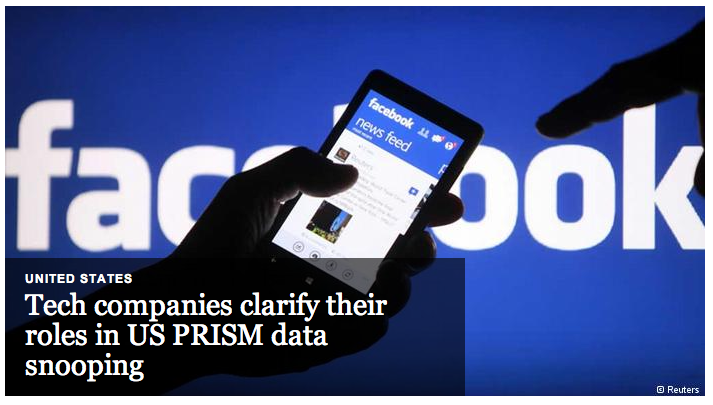PRISM?
-

Reading a little about PRISM of late and don't like what I am reading.
'The Guardian newspaper revealed PRISM earlier this month thanks to an exclusive meeting with a whistleblower. According to documents allegedly leaked by ex-CIA contractor Edward Snowden, the program gives the US government direct access to the servers of major Internet companies like Facebook, Google and Apple.'
The EU is however seeking to have matters clarified,
*'EU seeks 'more info' on PRISM
European officials have voiced concern that PRISM has been used to monitor EU citizens, a potential violation of the 27-member bloc's data protection rules.
EU Home Affairs Commissioner Cecilia Malmstrom and Justice Commissioner Viviane Reding established the agreement Friday, after meeting with US Attorney General Eric Holder in Ireland. Malmstrom confirmed the news on Twitter.
"Agreed with the US in Dublin to set up a transatlantic expert group to receive more info on PRISM and look at the safeguards," she wrote.
In Germany, ministers have questioned Internet companies over what information they provide governments.'*
Full article here, http://www.dw.de/tech-companies-clarify-their-roles-in-us-prism-data-snooping/a-16884405
-
You maybe ready to move forward... internet is made to heal itself - a way beyond originally thought by DARPA

-
@notareal
do you call it "forward"? -
In a sense that there are alternatives for "reporting" your online activities to the government. But if you look on functionality, alternative may lack on some areas, like slower DNS response or jumping out from windows is a PITA (if there are no alternative programs made for linux), bitcoins have serious limitations (comparing with number of sites that use paypal) or so...
But there are alternatives and maybe they have a change to develop now further, if people do start to use those. -
@unknownuser said:
A confidential classification shows that the NSA considered the Federal Republic as a partner, but simultaneously also as attack target. Hence Germany belongs to so-called third-rate partners […]"
Furthermore, the article says that the NSA has a basis in Frankfurt (a major network junction) to survey 500M connections/month, and not only tapped data that is accessible from outside (cloud companies in the US or sea cables in the Atlantic).
As it seems there is a "war" going on, but nobody has noticed being under attack. All the efforts of cyber war defense (and war on terrorism) have been turned into the opposite, namely attack and compromising of systems and servers worldwide.
So not really a surprise why Edward Snowden's arrestment is pursued at high-speed instead of investigating the constitutional breaches. This needs to be initiated by functioning democratic political institutions, and not only on international pressure.
This is again exemplary for the principles of a sane democracy and separation of powers. If secret services are not included in the balance and control between political powers, they can do what they want. The past decades have shown the USA as the surviving "good" power (which by principle no real combatant can be) of the cold war, and left to them trust and responsibilities that made it too easy to drift away from the right path.
For the future it's probably better not to resist to assign international matters to international institutions (internet, ICANN; UNSC, UNO, etc.).
-
Compare this with any other scandal. It is surprising and ashaming what happens.
-
US government / Obama narrow-mindedly focus on catching Snowden while ignoring that they are actually standing on the pillory. They rather close doors for friends.
-
US media see Snowden just as a curiosity (a game). An alternative to Jungle Camp.
-
Governing politicians don't dare to defend rights of the people who elected them. They accept being put in front of closed doors because it's more convenient.
-
Non-governing parties dare to raise their voice for people who still won't elect them.
-
Rogue states try to abuse the events for their own purpose. Though they are the only ones who can live their souveranity.
All of these points don't help anything for a proper investigation (as it is normal for any other scandal, like bribery scandals etc.). An investigation would need to lead by someone who is not involved, has nothing to loose (diplomatic relations) and nothing to win. Ideally it would not be possible to pressurize (economic disadvantages etc.).
As it seems, such a person/institution can nowadays only be anonymous.
-
-
-
Maybe a solution?
-
@mike lucey said:
Maybe a solution?
I am not quite sure http://www.xda-developers.com/android/heml-is-this-just-isnt-security/
-
-
Here is an interesting and insightful interview with congressman Neil Gallagher who was fighting Invasion of Privacy and introduced Privacy Bill in 1972, which was rejected. If a use of private information was a tool for controlling politicians already then, just think how it is used as a leverage today.
A Profile In Courage, Congressman Neil Gallagher - YouTube
[flash=854,480:3j67n9m9]http://www.youtube.com/v/byul-xnPFCM[/flash:3j67n9m9]
Advertisement







